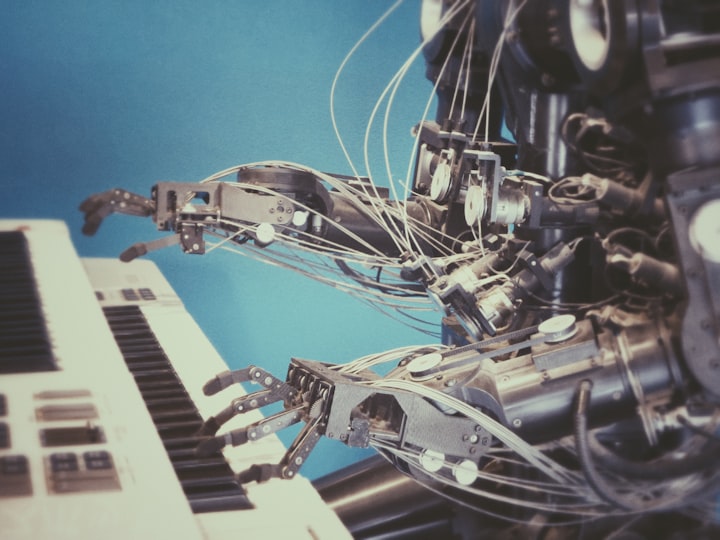The Impact of Artificial Intelligence on Various Industries
The AI Advantage (Book)

Artificial Intelligence (AI) has revolutionized the way industries operate, offering advanced solutions that enhance efficiency, productivity, and decision-making processes. In the book "The AI Advantage: How to Put the Artificial Intelligence Revolution to Work," the author explores the profound impact of AI on various industries. In this article, we will delve into the transformative power of AI and its implications across different sectors.
Introduction to Artificial Intelligence
Artificial Intelligence refers to the development of computer systems capable of performing tasks that typically require human intelligence. These systems can analyze vast amounts of data, learn from patterns, and make informed decisions. AI encompasses various subfields, including machine learning, natural language processing, computer vision, and robotics.
AI in Healthcare
Diagnosis and Treatment
AI algorithms can analyze medical data such as patient records, test results, and medical images to assist in accurate diagnosis and treatment planning. By identifying patterns and correlations in data, AI systems can offer valuable insights to healthcare professionals, leading to improved patient outcomes.
Personalized Medicine
AI enables the customization of medical treatments based on an individual's unique characteristics. By analyzing genetic data and patient profiles, AI can provide tailored treatment plans that maximize effectiveness and minimize side effects.
Drug Discovery
The process of discovering new drugs can be time-consuming and costly. AI algorithms can speed up the drug discovery process by analyzing vast amounts of data and identifying potential drug candidates with higher precision and efficiency.
Patient Monitoring
AI-powered wearable devices and monitoring systems can continuously collect and analyze patient data, providing real-time insights into a patient's health condition. This proactive approach allows for early detection of potential issues and timely intervention.
AI in Finance
Fraud Detection
AI algorithms can detect fraudulent activities in financial transactions by analyzing patterns and anomalies. By continuously monitoring and analyzing large volumes of data, AI systems can identify suspicious behavior and mitigate financial risks.
Algorithmic Trading
AI-powered algorithms can analyze market data, identify trends, and execute trades with exceptional speed and accuracy. This automation of trading processes enables investors to make data-driven decisions and capitalize on market opportunities.
Customer Service
AI chatbots and virtual assistants are transforming customer service by providing instant and personalized support. These AI systems can understand natural language queries, resolve customer issues, and offer recommendations, enhancing customer satisfaction.
Risk Assessment
AI models can analyze complex financial data and assess risk levels associated with investments, loans, and insurance. By considering multiple factors and historical data, AI systems help financial institutions make informed decisions and manage risks effectively.
AI in Manufacturing
Automation and Robotics
AI-powered robots and automation systems streamline manufacturing processes, improving productivity and precision. These intelligent machines can perform repetitive tasks, work collaboratively with humans, and adapt to changing production requirements.
Quality Control
AI systems can detect product defects and anomalies by analyzing sensor data, images, and historical manufacturing data. This real-time monitoring ensures the production of high-quality goods and reduces the need for manual inspection.
Predictive Maintenance
AI algorithms can predict equipment failures and maintenance needs by analyzing sensor data and historical maintenance records. This proactive approach minimizes unplanned downtime, optimizes maintenance schedules, and reduces costs.
Supply Chain Management
AI improves supply chain efficiency by optimizing inventory levels, predicting demand, and streamlining logistics operations. By analyzing data from various sources, AI systems enable better planning, reduce wastage, and enhance overall supply chain performance.
AI in Transportation
Autonomous Vehicles
AI plays a crucial role in the development of self-driving cars and autonomous vehicles. AI algorithms enable these vehicles to perceive their surroundings, make real-time decisions, and navigate safely on roads.
Traffic Optimization
AI-based traffic management systems analyze real-time data from various sources, such as cameras and sensors, to optimize traffic flow. These systems can dynamically adjust signal timings and suggest alternative routes, reducing congestion and improving travel time.
Predictive Maintenance
AI helps predict maintenance needs for transportation assets, such as vehicles and infrastructure. By analyzing data from sensors and historical maintenance records, AI systems can schedule maintenance activities proactively, minimizing disruptions and ensuring operational efficiency.
Enhanced Safety Measures
AI technologies, such as computer vision and sensor fusion, enhance safety in transportation. These systems can detect and alert drivers or take autonomous actions to prevent accidents, reducing the risk of human errors.
AI in Retail
Personalized Shopping Experience
AI enables personalized recommendations by analyzing customer data, purchase history, and browsing behavior. By understanding individual preferences, AI systems can suggest relevant products, improving customer satisfaction and boosting sales.
Inventory Management
AI algorithms optimize inventory levels by considering factors such as demand forecasts, sales patterns, and supplier lead times. This helps retailers reduce stockouts, avoid excess inventory, and maintain a balance between supply and demand.
Demand Forecasting
AI-based demand forecasting models analyze historical data, market trends, and external factors to predict future demand accurately. This enables retailers to optimize their supply chain, improve inventory planning, and meet customer demands efficiently.
Chatbots and Virtual Assistants
AI-powered chatbots and virtual assistants offer 24/7 customer support, answer queries, and provide product recommendations. These intelligent systems enhance the customer experience and increase engagement, ultimately driving sales.
AI in Education
Adaptive Learning
AI-powered educational platforms can adapt to individual students' needs and learning styles. By analyzing student performance data, AI systems can provide personalized learning materials, feedback, and assessments, enhancing educational outcomes.
Intelligent Tutoring Systems
AI-based tutoring systems offer personalized guidance to students by analyzing their strengths, weaknesses, and learning patterns. Thesesystems provide tailored explanations, practice exercises, and feedback, helping students grasp concepts effectively and improve their academic performance.
Automated Grading
AI algorithms can automate the grading process, saving teachers valuable time and providing prompt feedback to students. By analyzing student responses and predefined criteria, AI systems can assess assignments, quizzes, and exams accurately.
Personalized Education Plans
AI enables the creation of personalized education plans based on individual student needs and goals. By analyzing student data and performance metrics, AI systems can recommend appropriate courses, resources, and learning pathways, fostering a more efficient and tailored educational experience.
AI in Agriculture
Crop Monitoring and Management
AI-powered drones and satellite imagery enable farmers to monitor crops' health, growth, and nutrient levels accurately. By analyzing this data, AI systems can provide insights into crop conditions, helping farmers optimize irrigation, fertilizer application, and pest control.
Precision Farming
AI-based systems can analyze soil data, weather patterns, and historical yields to optimize farming practices. By providing recommendations on seeding, fertilizing, and harvesting timings, AI systems help farmers maximize productivity, reduce resource wastage, and minimize environmental impact.
Pest and Disease Detection
AI algorithms can analyze images of crops and detect early signs of pests, diseases, and nutrient deficiencies. By alerting farmers to potential issues, AI systems enable timely intervention, preventing crop damage and yield loss.
Harvesting Automation
AI-powered robots and machinery can automate harvesting processes, improving efficiency and reducing labor costs. These machines can identify ripe crops, harvest them with precision, and sort them according to quality standards, enhancing productivity and reducing post-harvest losses.
AI in Entertainment
Content Recommendation
AI algorithms analyze user preferences, viewing history, and engagement patterns to provide personalized content recommendations. Whether in streaming platforms or social media, AI systems enhance the entertainment experience by suggesting relevant movies, TV shows, music, and articles.
Virtual Reality and Augmented Reality
AI technologies enable immersive experiences through virtual reality (VR) and augmented reality (AR). By combining computer vision, natural language processing, and real-time data, AI systems create interactive and lifelike virtual environments, enhancing gaming, training simulations, and storytelling.
Voice and Facial Recognition
AI-based voice and facial recognition systems enhance user interactions in entertainment applications. These technologies allow for hands-free control, personalized experiences, and secure authentication, creating a seamless and engaging user experience.
Interactive Storytelling
AI-powered interactive storytelling platforms offer dynamic and personalized narratives. By adapting storylines based on user choices, preferences, and context, AI systems create immersive and engaging storytelling experiences across various media formats.
AI in Energy
Smart Grid Management
AI optimizes energy distribution and consumption in smart grids. By analyzing real-time data on energy demand, supply, and storage, AI systems enable efficient load balancing, grid stability, and integration of renewable energy sources.
Energy Efficiency Optimization
AI algorithms analyze energy usage patterns and identify opportunities for energy-saving measures. By providing insights into consumption patterns, AI systems help individuals and businesses optimize their energy usage, reduce costs, and minimize environmental impact.
Predictive Maintenance for Power Plants
AI-based predictive maintenance systems analyze sensor data, historical maintenance records, and equipment performance to predict maintenance needs and prevent unexpected failures in power plants. This approach minimizes downtime, improves operational efficiency, and reduces maintenance costs.
Renewable Energy Forecasting
AI models can forecast renewable energy generation based on weather data, historical patterns, and energy infrastructure. By providing accurate predictions, AI systems enable better planning and integration of renewable energy sources into the grid, facilitating the transition to a sustainable energy future.
Conclusion
The impact of artificial intelligence on various industries is undeniable. From healthcare and finance to manufacturing, transportation, retail, education, agriculture, entertainment, and energy, AI has transformed processes, improved efficiency, and unlocked new possibilities. As technology continues to advance, the integration of AI will continue to reshape industries, paving the way for a more intelligent and automated future.
Frequently Asked Questions
Q1: Is AI a threat to jobs in these industries?
AI technology may automate certain tasks, but it also creates new job opportunities. While some job roles may evolve or become obsolete, AI augments human capabilities, enabling individuals to focus on more complex and creative tasks.
Q2: How can AI enhance customer experiences in retail?
AI-powered systems offer personalized recommendations, virtual shopping assistants, and streamlined customer support. These features enhance convenience, engagement, and satisfaction, providing a seamless shopping experience.
Q3: Are there any ethical concerns related to AI in healthcare?
Yes, there are ethical considerations such as privacy, data security, and bias in AI algorithms. It's crucial to ensure proper data handling, transparency, and fairness in AI applications to maintain patient trust and uphold ethical standards.
Q4: Can AI replace human teachers in education?
AI can augment teaching and provide personalized support, but the role of human teachers remains essential. Teachers provide mentorship, emotional support, and critical thinking skills that AI systems cannot replicate.
Q5: How does AI contribute to sustainable energy practices?
AI optimizes energy distribution, predicts renewable energy generation, and identifies energy-saving opportunities. By maximizing efficiency and integrating renewable sources, AI plays a vital role in achieving sustainable energy practices.
Link to buy the book:
https://amzn.to/46BWUZA





Comments
There are no comments for this story
Be the first to respond and start the conversation.